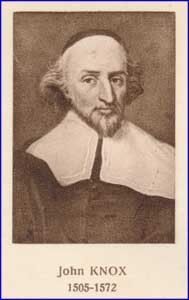A Full Defense of his Opinions
 In February 1549, after an imprisonment of 19 months, Knox obtained his release from the French galleys. Since he probably obtained his freedom due to the intercession of King Edward VI or the English government (they had been negotiating for the release of English and Scottish protestant prisoners in exchange for French prisoners), he came to London, and was favorably received by Archbishop Cranmer and the lords of council. He remained in England for five years, during which time he was first appointed preacher to Berwick, then to Newcastle.
In February 1549, after an imprisonment of 19 months, Knox obtained his release from the French galleys. Since he probably obtained his freedom due to the intercession of King Edward VI or the English government (they had been negotiating for the release of English and Scottish protestant prisoners in exchange for French prisoners), he came to London, and was favorably received by Archbishop Cranmer and the lords of council. He remained in England for five years, during which time he was first appointed preacher to Berwick, then to Newcastle.
At Berwick, where he labored for two years, he preached with his characteristic fervor and zeal, exposing the errors of Romanism with unsparing severity. Although Protestantism was the official position of the Church of England since the reign of Henry VIII, there were many loyal Roman Catholics (papists), even in the high ranks of the clergy. The bishop of John Knox’s diocese, Dr. Cuthbert Tunstall, was an avid Catholic. Knox was accused of asserting that the sacrifice of the Mass is idolatrous, and was cited to appear before the bishop to give an account of his preaching. On April 4, 1550, Knox entered into a full defense of his opinions, and with the utmost boldness proceeded to argue that the mass is a superstitious and idolatrous substitute for the sacrament of the Lord’s Supper. (vol. 3 of History 54,-56). The bishop did not venture to pronounce any ecclesiastical censure.
The fame of the preacher was only extended by this feeble attempt to restrain his boldness. From a manuscript discovered in the 1870’s titled, “The practice of the Lord’s Supper used in Berwick by John Knox, 1550,” we now know that the very beginning of Puritan practice in the Church of England in the administration of the Lord’s Supper is to be found in the practice followed by Knox at Berwick, inasmuch as he substituted common bread for the bread wafers, and gave the first example of substituting sitting instead of kneeling in the receiving of communion.
“It was during this time [1553] that John Knox developed a theology of resistance to tyranny. He began smuggling pamphlets into England. The most significant of these was the Admonition to England. With this move, he had stepped into new territory, going further than any Reformer had previously gone.”–Francis Schaeffer, from A Christian Manifesto
Words to Live By:
We Presbyterians owe much to John Knox and we would profit greatly from taking up a fresh study of his life and writings. 2014 was the 500th anniversary of his birth, and so we had many posts last year on facets of his ministry. In his time, he stood resolutely for the Scriptures and was greatly blessed of God to bring about real change in his nation. Even now God has placed among us those who can and are speaking with bold testimony to the eternal truths of the Gospel. We need not name them. We cannot name them all. But we can all remember to pray for those whom the Lord will use for His glory in these trying times. May the Lord give us strong voices to faithfully declare His Word.
Psalm 20
The Lord hear thee in the day of trouble;
the name of the God of Jacob defend thee;
Send thee help from the sanctuary,
and strengthen thee out of Zion;
Remember all thy offerings,
and accept thy burnt sacrifice; Selah.
Grant thee according to thine own heart,
and fulfil all thy counsel.
We will rejoice in thy salvation,
and in the name of our God we will set up our banners:
the Lord fulfil all thy petitions.
Now know I that the Lord saveth his anointed;
he will hear him from his holy heaven
with the saving strength of his right hand.
Some trust in chariots, and some in horses:
but we will remember the name of the Lord our God.
They are brought down and fallen:
but we are risen, and stand upright.
Save, Lord:
let the king hear us when we call.
